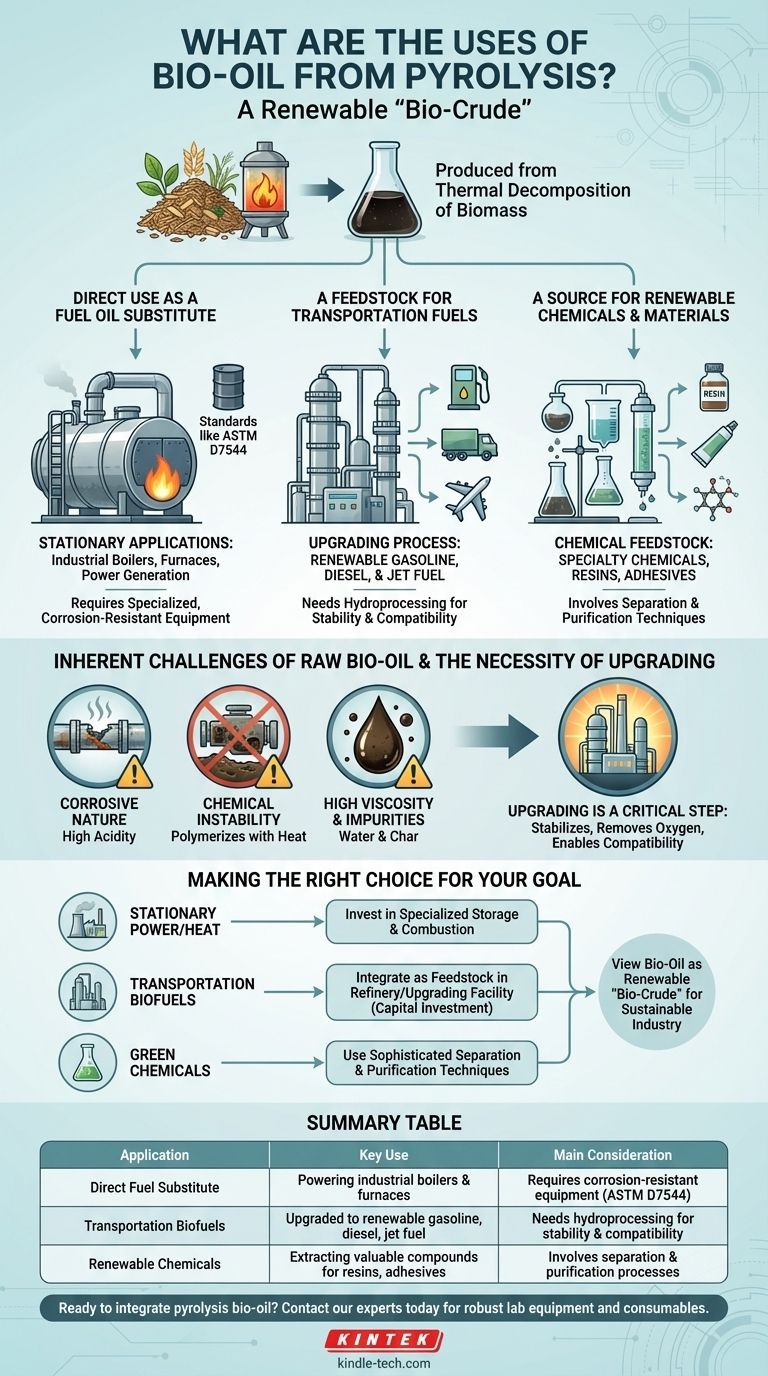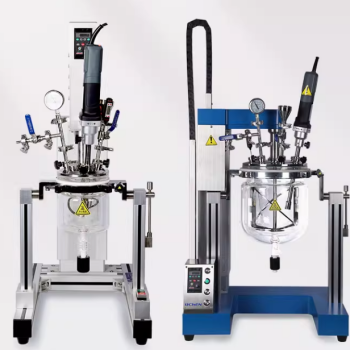في جوهره، الزيت الحيوي الناتج عن التحلل الحراري هو سائل متعدد الاستخدامات ينتج عن التحلل الحراري للكتلة الحيوية. يخدم هذا "النفط الحيوي الخام" المتجدد ثلاث وظائف أساسية: يمكن استخدامه مباشرة كبديل لزيت الوقود الصناعي في التطبيقات الثابتة، أو ترقيته إلى وقود حيوي من درجة النقل مثل البنزين والديزل، أو تكريره لاستخراج المواد الكيميائية والمواد القيمة.
يمثل الزيت الحيوي فرصة كبيرة للطاقة المتجددة والمواد الكيميائية، ولكن استخدامه العملي ليس سهلاً. المفتاح هو فهم أن الزيت الحيوي الخام هو منتج وسيط، يشبه إلى حد كبير النفط الخام الأحفوري، والذي يتطلب المعالجة والترقية للتغلب على تآكله وعدم استقراره المتأصل قبل أن يتم دمجه في البنية التحتية الحالية.

التطبيقات الأساسية للزيت الحيوي
تسمح مرونة الزيت الحيوي له بالاندماج في عدة أجزاء من سلاسل قيمة الطاقة والمواد الكيميائية. يعتمد تطبيقه بشكل كبير على مستوى المعالجة والتكرير الذي يخضع له بعد الإنتاج.
الاستخدام المباشر كبديل لزيت الوقود
التطبيق الأكثر فورية للزيت الحيوي هو كبديل مباشر لزيوت الوقود التقليدية.
هذا مخصص بشكل أساسي للتطبيقات الثابتة مثل الغلايات الصناعية والأفران ووحدات توليد الطاقة على نطاق واسع. يحكم استخدامه في هذه السياقات معايير مثل ASTM D7544، التي تحدد الخصائص المطلوبة لزيت التحلل الحراري المستخدم في الشعلات.
مادة خام لوقود النقل
الزيت الحيوي الخام ليس وقودًا "جاهزًا للاستخدام" لمحركات الديزل أو البنزين القياسية. إنه شديد الحمضية وغير مستقر.
ومع ذلك، يمكن إرساله إلى البنية التحتية لمصافي التكرير الحالية للترقية. من خلال عمليات مثل المعالجة الهيدروجينية، يتم إزالة الأكسجين وتثبيت الجزيئات، وتحويل النفط الحيوي الخام إلى وقود هيدروكربوني تقليدي. يسمح هذا المسار بإنتاج البنزين والديزل ووقود الطائرات المتجدد.
مصدر للمواد الكيميائية والمواد المتجددة
بالإضافة إلى الوقود، الزيت الحيوي هو خليط معقد من المركبات العضوية القيمة.
يمكن استخدامه كمادة خام كيميائية لإنتاج المواد الكيميائية المتخصصة والراتنجات والمواد اللاصقة وغيرها من المواد. يتعامل هذا النهج مع الزيت الحيوي ليس كوقود بكميات كبيرة ولكن كمصدر يمكن استخراج وتنقية مكونات محددة عالية القيمة منه.
فهم التحديات المتأصلة للزيت الحيوي الخام
يحد من انتشار استخدام الزيت الحيوي العديد من العقبات التقنية المرتبطة بحالته الخام غير المعالجة. يعد إدراك هذه التحديات أمرًا بالغ الأهمية لفهم إمكاناته في العالم الحقيقي.
طبيعة التآكل
الزيت الحيوي شديد الحمضية، وله درجة حموضة يمكن أن تكون ضارة بالأنابيب والمضخات وخزانات التخزين القياسية المصنوعة من المعادن الشائعة. تتطلب هذه الخاصية المسببة للتآكل استخدام مواد متخصصة ومقاومة للتآكل للتعامل والنقل.
عدم الاستقرار الكيميائي
على عكس النفط الخام المستقر، يتفاعل الزيت الحيوي كيميائيًا ويمكن أن يتدهور بمرور الوقت. يمكن أن يؤدي التعرض للحرارة إلى زيادة كثافته وبلمرته وتكوين مواد صلبة، مما يؤدي إلى الانسداد والتلوث في المحركات وخطوط الوقود. هذا الاستقرار المنخفض يجعل التخزين طويل الأجل تحديًا كبيرًا.
اللزوجة العالية والشوائب
يتميز الزيت الحيوي عادةً بلزوجة أعلى من الوقود التقليدي ويحتوي على كمية كبيرة من الماء وجزيئات الفحم الصلبة. تجعل هذه الخصائص من الصعب تذرية الزيت في المحركات ويمكن أن تؤدي إلى احتراق غير كامل وتلف المعدات.
ضرورة الترقية
هذه التحديات - التآكل وعدم الاستقرار والشوائب - هي السبب في أن الترقية خطوة حاسمة لمعظم التطبيقات عالية القيمة. تعمل الترقية على تثبيت الزيت، وإزالة الأكسجين المسبب للتآكل، وتجعله متوافقًا مع المحركات وخطوط الأنابيب ومعدات التكرير الموجودة.
اختيار الخيار الصحيح لهدفك
يعتمد الاستخدام الأمثل للزيت الحيوي كليًا على قدراتك التقنية وهدف الاستخدام النهائي.
- إذا كان تركيزك الأساسي هو توليد الطاقة الثابتة أو الحرارة: يمكنك استخدام الزيت الحيوي مباشرة، ولكن يجب عليك الاستثمار في معدات تخزين واحتراق متخصصة مصممة للتعامل مع طبيعته المسببة للتآكل واللزجة.
- إذا كان تركيزك الأساسي هو إنتاج وقود حيوي متقدم للنقل: الهدف هو دمج الزيت الحيوي كمادة خام في مصفاة أو منشأة ترقية، وهو ما يتطلب استثمارًا رأسماليًا كبيرًا في تكنولوجيا المعالجة الهيدروجينية.
- إذا كان تركيزك الأساسي هو تطوير مواد كيميائية خضراء: ستتضمن استراتيجيتك تقنيات فصل وتنقية متطورة لاستخراج المركبات الكيميائية عالية القيمة من خليط الزيت الحيوي المعقد.
في النهاية، فإن النظر إلى الزيت الحيوي ليس كمنتج نهائي ولكن كـ "نفط حيوي خام" متجدد هو المفتاح لفتح دوره في مشهد صناعي أكثر استدامة.
جدول الملخص:
| التطبيق | الاستخدام الرئيسي | الاعتبار الرئيسي |
|---|---|---|
| بديل وقود مباشر | تشغيل الغلايات والأفران الصناعية | يتطلب معدات مقاومة للتآكل (ASTM D7544) |
| وقود حيوي للنقل | يتم ترقيته إلى بنزين، ديزل، وقود طائرات متجدد | يحتاج إلى معالجة هيدروجينية للاستقرار والتوافق |
| مواد كيميائية متجددة | استخلاص مركبات قيمة للراتنجات والمواد اللاصقة | يتضمن عمليات فصل وتنقية |
هل أنت مستعد لدمج الزيت الحيوي الناتج عن التحلل الحراري في إنتاجك للطاقة المستدامة أو المواد الكيميائية؟ تتخصص KINTEK في توفير معدات مختبرية قوية ومواد استهلاكية لمعالجة الكتلة الحيوية وتحليل الزيت الحيوي. سواء كنت تبحث عن ترقية الوقود أو استخلاص المواد الكيميائية، فإن حلولنا تساعدك على التغلب على التحديات مثل التآكل وعدم الاستقرار. اتصل بخبرائنا اليوم للعثور على الأدوات المناسبة لاحتياجات مختبرك!
دليل مرئي

المنتجات ذات الصلة
- مجمع تيار رقائق الألومنيوم لبطارية الليثيوم
- تجميع ختم الرصاص لتمرير القطب الكهربائي بالتفريغ بشفة CF KF لأنظمة التفريغ
- أنبوب سيراميك نيتريد البورون (BN)
- فرن التلدين بالتفريغ الهوائي
- فرن تفحيم بالغرافيت الفراغي IGBT فرن تجريبي للتفحيم
يسأل الناس أيضًا
- ما هو ترسيب البخار الكيميائي المعدني العضوي (MOCVD)؟ شرح نمو أشباه الموصلات المتقدم
- ما هي طريقة الترسيب الفيزيائي للبخار للمواد النانوية؟ دليل للأغشية الرقيقة عالية الأداء
- كيف تختلف أنماط نمو الماس HPHT و CVD والماس الطبيعي؟ اكتشف شكل الأحجار المخبرية مقابل الأحجار المستخرجة
- كيف تقارن نافذة العزل الكهربائي من النوع المجوف بنافذة كوارتز مسطحة؟ تعزيز تجانس ترسيب البلازما
- ما هي استخدامات الترسيب الكيميائي للبخار؟ دليل للأغشية الرقيقة عالية الأداء
- ما هي آلية الترسيب بالرش (Sputter Deposition)؟ دليل خطوة بخطوة لطلاء الأغشية الرقيقة
- ما هو شكل الماس CVD؟ الشكل الهندسي والمسطح للماس المزروع في المختبر
- ما هي المواد النانوية المستخدمة في طريقة الترسيب الكيميائي للبخار (CVD)؟ تصنيع المواد النانوية عالية الأداء بدقة










